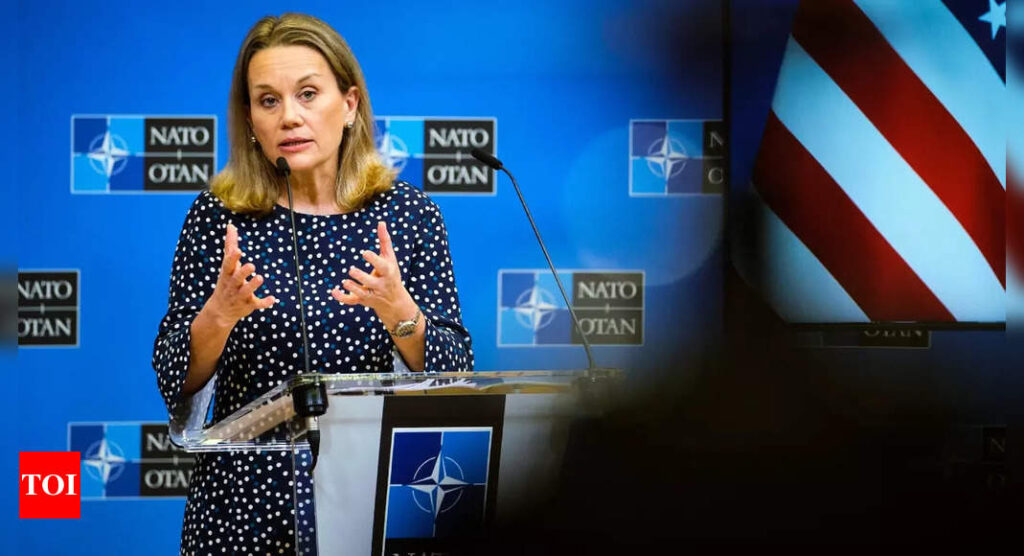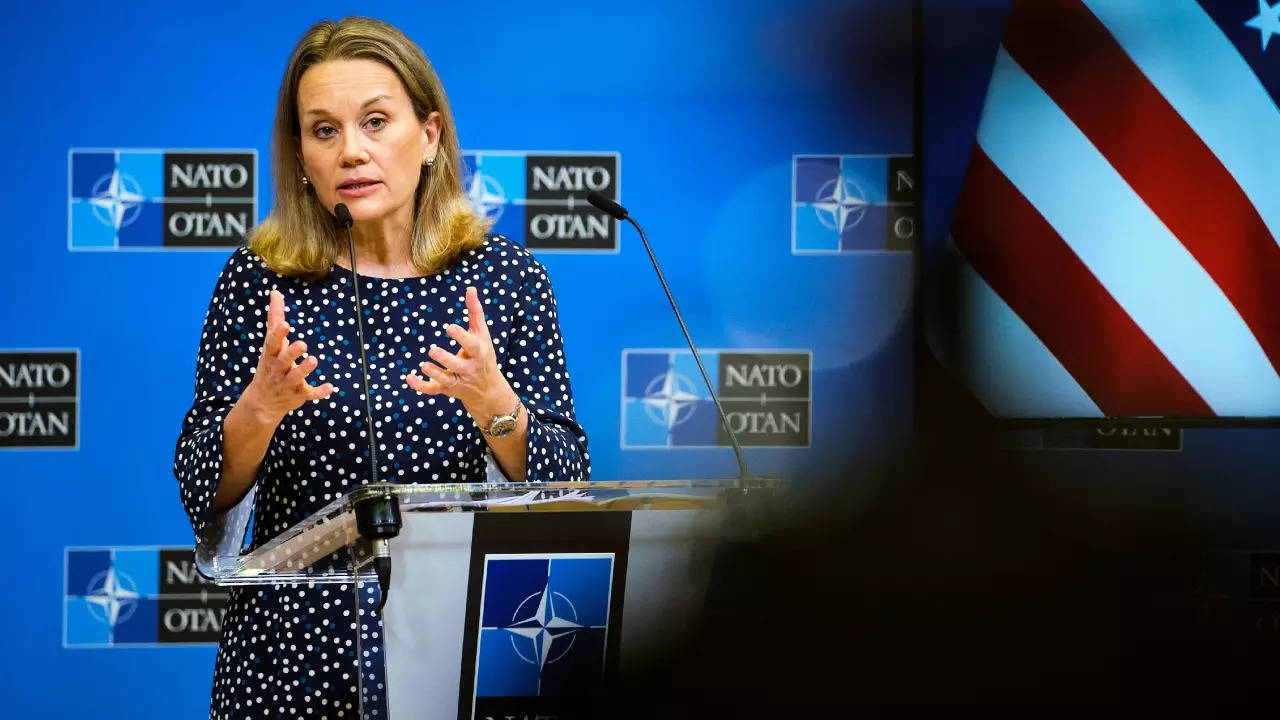[ad_1]
Excerpts:
Nineteen months after Russia invaded Ukraine, there’s no end to the war in sight and NATO, in fact, is still warning allies to prepare for a long war. What will it take to end this war?
NATO allies are continuing to support Ukraine’s efforts to defend its territory against Russian aggression. We have tried over many months to get Russia to stop the war. We have used unprecedented sanctions. We have isolated Russia on the world stage. We have warned them about the dangers of escalation and most importantly, we have reminded them that they are violating the core principles of the UN Charter as it relates to sovereignty and territorial integrity. Sadly, the Russians have not stopped this war. Not only are they battling Ukrainian forces, but they are pursuing these indiscriminate attacks on civilians and civilian infrastructure. They are also targeting grain storage facilities and trying to starve or likely freeze over the winter Ukrainians to make it harder for citizens to go about their everyday lives. So, our support will continue. The counter-offensive has been underway for the past couple of months. The Ukrainians have made some very important advances over the past few weeks, but we do anticipate that the weather will change soon. It will become much muddier in Ukraine and for that reason some of the fighting will slow down. We are very much hoping that the Russians do not return to the tactics they pursued last winter. We hope they won’t start attacking the energy grid inside Ukraine, but we fear they will. And so, we want to help the Ukrainians prepare for a possible cold winter as well
Moscow believes its position on the war has been vindicated by the G20 declaration that didn’t condemn Russia. How does that help in convincing Russia to end the war? Also, what do you make of the assessment by Indian authorities that the G20 consensus on Ukraine could provide a pathway to resolving the conflict?
Couple of things on that front. Let me thank India for its presidency of G20. We appreciate the leadership India has provided. I also want to thank India for the important humanitarian assistance that it is providing to Ukraine. We don’t agree with the statement that it was watered down. What we liked seeing was the reference to those 2 principles in the UN Charter – sovereignty and territorial integrity. I think collectively the G20 agreed that it is important to protect those 2 principles. The consensus among the G20 was that we must uphold international law and protect the UN Charter. Russia is clearly violating the UN Charter at the moment, and we take comfort from the fact that the global community seems concerned about what Russia is doing, both for its direct aggression against Ukrainian forces and people and because of what they are fundamentally doing to the UN Charter. Our perspective is that India appreciates and G20 members appreciate that and collectively we all want this war to end.
You have wanted India to take the initiative for any engagement with NATO. Do you notice any willingness now? Also, do you see India playing any sort of role in ending the war?
Well, NATO remains open minded about possible dialogue with India but ultimately it’s a decision that rests in the hands of our friends in India. Should they be interested in dialogue with NATO allies as some of the like-minded democracies with shared values, we would be open to that. We could foresee engagement on a couple of different issues. India might find it helpful to share our collective experiences in dealing with climate security and climate change. Maybe we could have a conversation about non-proliferation, maritime security, cyber security. But again, no pressure from the NATO side. We leave it in India’s hands. On the war in Ukraine, we appreciate India’s efforts to try and get both sides to come to the negotiating table. We applaud any country’s efforts to do so as long as that country is willing to engage both Ukrainians and Russians. It cannot be one sided. India showed a willingness to do that but sadly none of the efforts that have been pursued till now have succeeded in convincing the Russians to stop the war but we will support other country’s efforts to try and end this war.
NATO has criticised China for its opaque intentions and military buildup. Looking ahead, and beyond the partnership with countries like Japan, Australia New Zealand and South Korea, what sort of role do you see NATO playing to facilitate efforts to ensure a free, open and inclusive Indo-Pacific where the rule of law is followed?
Well, I want to be clear that NATO is a Euro-Atlantic alliance and will remain so. NATO is not looking to expand its membership into the Indo-Pacific. All that said, we do have some formal partners in the Indo-Pacific. You named them. These are 4 countries that have expressed interest in partnering with the NATO alliance, not joining it. They are interested in sharing best practices, lessons learnt as it relates to China’s hybrid tactics but also Russia’s hybrid tactics and the deepening relationship between China and Russia. Going forward, NATO is open to engaging in dialogue with other countries in the Indo-Pacific if they would find that useful but I’d say bilaterally, separate from NATO, the US is also working with India through Quad in the Indo-Pacific and that provides us a formal process and structure to work with our friends in India to benefit from their knowledge and expertise and to learn from and share things with each other as we all work to bring peace and stability to the Indo-Pacific and keep it free and open. So, we will continue to look for bilateral engagements with India, we will continue to work with them though Quad and going forward, if India has any interest in engaging in dialogue with NATO, again we would see some benefit in doing so.
What do you make of Ukraine’s demand for more modern weapons to repel Russian forces? Also, what’s the status of the proposal for Ukraine’s membership of NATO? Is it a done deal or will they have to wait for now?
Ukraine has the right to defend its territory. They are being attacked. It’s unprovoked aggression pursued by Russia. Again, Russia could end the war today if it so desired and so till that happens, I think there will be a collection of countries including the US and allies who are willing to assist Ukraine as they defend their territory. We are not putting troops in Ukraine, and we are not party to the conflict, but we believe they have a right to self-defense as stated in the UN Charter. On their membership aspirations, NATO has been quite clear. We have said that their future place is in NATO and in 2008 we said they will ultimately become a member of the alliance. But right now, while there is a full-scale war unfolding on their territory, we believe the most important thing we can be doing is to provide practical assistance so that they can end the war and get Russia out of its territory. Over the long term, we all collectively see that Ukraine will someday become a member of the alliance and we were able to reaffirm that when we just had the summit in Vilnius 2 months ago.
[ad_2]
Source link











More Stories
We can’t wait to face India in the final: Pat Cummins | Cricket News
Railways plans 3,000 additional trains in next 4-5 years to minimise number of waitlisted tickets | India News
Faridabad: Man dies after ‘falling from hotel room window’ while partying with friends